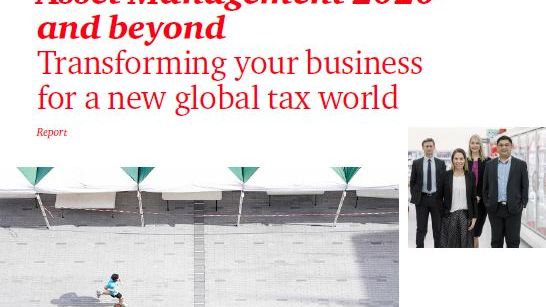
Press release -
Tax set to play critical role in determining front-runners in Global Asset Management
| Date | 5 October 2015 |
|
Contact |
Candy Li Tel: +65 6236 7429 Mobile: +65 8613 8820 E-mail: candy.yt.li@sg.pwc.com Natalie Choo Tel: +65 6236 4309 Mobile: +65 9738 1415 E-mail: natalie.yl.choo@sg.pwc.com |
Singapore, 5 October 2015 –Global assets under management (AuM) are set to swell toUS$102 trillion in 2020 and according to a new report from PwC, the tax function, which is about to undergo significant change, will be critical in determining those players in the market who will be best positioned to win greater share of business in the lead up to it.
According to the report, ‘Asset Management 2020 and beyond: Transforming your business for a new global tax world’,as banks and insurers retreat from many businesslines, asset managers are becoming more influential across a range of products, creating a new breed of global mega-managers. This is attracting huge focus from tax authorities, who, come 2020, will have specialist teams with the capabilities to carry out much more detailed enquiries than in the past, and the powers to request real-time investor-related information.
Investors, therefore, will expect asset management providers to have robust and efficient tax infrastructures. They will have minimal tolerance of tax uncertainty or tax adjustments and gravitate towards providers that offer products reflecting investor-specific tax profiles. Prospective investors will ask about tax disclosures even taking their individual tax charge into account before they consider investing in a fund. They will seek more certainty with respect to tax issues.
Portfolio taxation will become a key battleground
When launching new products, therefore, asset managers will routinely have to carry out full assessments to make them competitive in all channels. With more transaction taxes, local withholding and self-assessment capital gains regimes, every asset purchase and sale will have to be carefully examined from a tax risk and reporting perspective. This will require asset managers to have real-time access to data on global tax regimes.
PwC expects a number of integrated businesses combining asset management, wealth management and private banking activities with the ability to provide a full tax advisory service to clients, to emerge.
“Leading up to 2020, investors’ evaluation on how their portfolios perform will focus predominantly on post-tax yields. Asset managers therefore, will have little choice but to respond by dispersing their strategic tax resources throughout their business operations to give front, middle and back office staff access to real-time expertise,” says Anuj Kagalwala, Asset Management Tax Leader, PwC Singapore
“In tandem in-house asset management tax teams will need to evolve to deal with perpetual audits and to engage with tax authorities on a frequent basis to influence policy and help guide the implementation of tax rules.”
Tax technology will be key to performance and client satisfaction
Technology for tax will enable investment firms to make timely tax-informed investment decisions and provide investors and tax authorities with the transparency and reporting they demand. It will also create the ability to differentiate between the alpha - the return in excess of a benchmark index or "risk-free" investment, created by the portfolio manager and that created (indirectly) by the capability of the tax team, to manage tax leakage and tax risk.
Technology will not only be close to the heart of asset managers – the tax authorities will also have made significant investments by 2020 too hence the age of selected paper-based reporting by asset managers to the tax authorities will be over. Tax authorities will request whatever information they want from asset managers through having direct access to their IT systems rather than asset managers pushing data to them.
Anuj Kagalwala, Asset Management Tax Leader, PwC Singapore concludes:
“Tax and reputation in the world of asset management, will be inseparable. This emerging trend applies as much to Singapore as to the rest of the world. The increased complexity of the tax function will require that it spends significant periods of time with operational activities in order to be able to act as a trusted advisor internally and to key executives. Asset managers will need to ensure highly-skilled tax people are brought into the heart of the business. The tone needs to be set at the top. The tax function is critical to the entire operation and senior management will need to make sure this is well understood.”
ENDS
Notes to Editors:
To help asset managers plan for the future, PwC’s report ‘Asset Management 2020 and beyond: Transforming your business for a new global tax world’sets out a vision ofwhat the tax landscape will look like in 2020 and beyond, and examines what it means for asset managers and their clients. The report recognizes that change will come incrementally, but should be started soon with a long term strategic vision of how the tax function should operate, how it is resourced, and its role within the overall business, in mind. The report then sets out the characteristics of such a vision.
Topics
Categories
About PwC
At PwC, our purpose is to build trust in society and solve important problems. We’re a network of firms in 157 countries with more than 208,000 people who are committed to delivering quality in assurance, advisory and tax services. Find out more and tell us what matters to you by visiting us at www.pwc.com.
PwC refers to the PwC network and/or one or more of its member firms, each of which is a separate legal entity. Please see www.pwc.com/structure for further details.
©2015 PwC. All rights reserved



